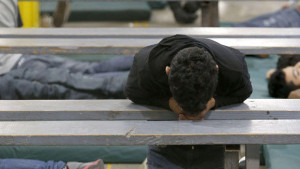
Bored, alone, asleep? Boy in detention center Photo ffom 2014
On July 22, 2014, almost four years ago, I raised this issue on AAM’s Future of Museums blog: Unacompanied Children at our Borders: Can Museums Help? It didn’t attract much attention, but this was before #museumsrespondtoFerguson, #MuseumsAreNotNeutral, Museums and Race, MASSAction, and countless other disussions and initiatives regarding museums’ engagement with and responsibility to the world outside their doors.
Today when the issue of immigration along our southern border has become even more fraught with the seizure and separation of children from their parents, the question remains: Do museums have any role to play? In the 2014 post I wondered whether museums near holding centers might assist the middle school kids and teens detained for weeks with activities and bilingual staff. Today, it appears that many of the children are much younger, and their situation is far more traumatic and contentious. Direct involvement by museums might do more harm than good. But does that mean that we do nothing, say nothing?
It would be presumptuous of me to suggest specific actions for this situation. Museums near the detention centers must know their communities and the border situation better than someone blogging from DC. Still I am looking for some indication of awareness from the field about this egregious human rights violation by our country. In addition to awareness I’m looking for some sign that mueums are trying to connect around this issue. I’ve checked the websites of our major national museum organizations, as well as those of children’s museums and museums focusing on immigration. So far–total silence. But perhaps you know of museums or cultural organizations that are demonstrating awareness and commitment in this area. I’d love to know more about these. Please tweet me @gretchjenn. Thanks.
Niños en la frontera: ¿Dónde están los museos? Translation by Nayeli Zepeda
En julio 22 de 2014, hace casi cuatro años, plantee este tema en el blog Future of Museums de AAM: Niños no acompañados en nuestras fronteras: ¿Pueden los museos ayudar? (Unacompanied Children at our Borders: Can Museums Help?). No atrajo mucha atención, pero esto fue antes de #museumsrespondtoFerguson, #MuseumsAreNotNeutral, Museums and Race, MASSAction y otras innumerables discusiones e iniciativas sobre el compromiso y responsabilidad del museo con el mundo fuera de sus puertas.
Hoy, cuando el tema de migración a lo largo de nuestra frontera sur se ha vuelto más tenso con la aprehensión y separación de niños de sus padres, la pregunta se mantiene: ¿Los museos tienen un rol en esto? En el post de 2014, me preguntaba si los museos cerca de centros de detención pueden auxiliar a niños y adolescentes de educación media detenidos por semanas con actividades y personal bilingüe. Hoy, parece que muchos de esos niños son más pequeños, y su situación es mucho más traumática y contenciosa. La implicación directa de los museos puede hacer más daño que bien. Pero ¿eso quiere decir que no hagamos nada, que no digamos nada?
Sería pretencioso de mi parte sugerir acciones específicas para esta situación. Los museos cerca de centros de detención deben conocer mejor a sus comunidades y la situación en la frontera que alguien que escribe desde DC. Aún estoy buscando algún indicio de conciencia del campo acerca de esta atroz violación de derechos humanos que está haciendo nuestro país. Además de conciencia, estoy buscando alguna evidencia de que los museos están tratando de conectar alrededor de este tema. He revisado los websites de las organizaciones de museos nacionales más importantes, así como los de museos de niños y museos centrados en migración. Hasta ahora, silencio total. Pero quizá ustedes conozcan museos u organizaciones culturales que están demostrando conciencia y compromiso en esta área. Me gustaría saber más de éstos. Por favor, escríbanme en Twitter @gretchjenn. Gracias.

Gretchen – there is a Teach-In organized through Teachers Against Child Detention for the Tornillo Texas detention camp. More info here: https://www.teachersagainstchilddetention.org
Great piece, Gretchen!
Thanks, Therese, just getting back to things after being in India. G